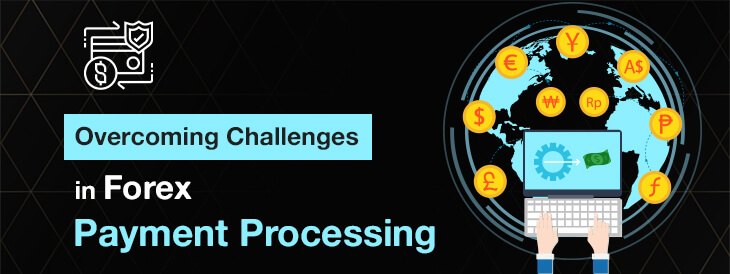Overcoming Challenges in Forex Payment Processing
Overcoming Challenges in Forex Payment Processing

The ever-evolving financial landscape presents significant opportunities and risks. One such realm is forex payment processing. As businesses become more global, the need for efficient, secure, and cost-effective payment processing in foreign currencies has never been more critical. This post will delve into the complexities and strategies for overcoming challenges in forex payment processing.
Understanding the Challenges in Forex Payment Processing
The process of forex payment processing comes with its own set of difficulties due to the involvement of multiple currencies and a multitude of regulatory frameworks.
Businesses may encounter obstacles such as elevated transaction fees, potential fraud risks, the instability of exchange rates, and strict regulatory compliance.
Additionally, payment processing time lags due to diverse processing periods across nations can be a challenge. These stumbling blocks can create a significant monetary impact on enterprises, influencing their profitability and global competitiveness.
Some Related Blogs
- Unlocking Success: 6 Ways To Optimize Payment Processing
- Navigating Your Finances: Dodge Common Credit Card Mistakes
- Understanding Echeck: How Long Is The Clearance Time?
- A Comprehensive Guide To High-risk Merchant Accounts For Your Gaming Business
Embracing Technology to Overcome Forex Payment Processing Difficulties
Leveraging advancements in technology can be a game-changer in navigating the complexities of forex payment processing. Key technologies like artificial intelligence (AI) and blockchain can be employed to counteract common challenges.
AI can provide an extra layer of security by swiftly identifying fraudulent transactions, thereby reducing potential losses. On the other hand, blockchain technology brings an unprecedented level of transparency and security to the payment process, with its decentralized nature eliminating the need for intermediaries.
This not only reduces transaction costs but also shortens the processing times. Businesses should not shy away from harnessing these technological innovations to streamline their forex payment processing systems.
The Importance of Compliance in Forex Payment Processing
Abiding by the rules and regulations in each country of operation is paramount in forex payment processing.
It necessitates adherence to procedures like know-your-customer (KYC) and anti-money laundering (AML) protocols.
Observing these regulations not only avoids potential legal issues but also builds confidence among clientele and business associates.
Hence, firms must establish and maintain stringent systems to regularly monitor and ensure unwavering obedience to these policies.
Managing Exchange Rate Risk in Forex Payment Processing
Exchange rate volatility is a considerable risk in forex payment processing. Businesses can employ strategies like forward contracts to hedge this risk. Forward contracts allow businesses to secure a specified exchange rate for a future transaction, providing a level of predictability amidst currency fluctuations. Another strategy is holding accounts in multiple currencies.
This tactic empowers businesses to opt for the most advantageous exchange rate available at any point in time. However, this approach necessitates a robust currency management system to efficiently handle multiple accounts.
Although it may require initial investment and setup, this strategy can significantly curtail exchange rate risks, promoting greater financial stability in forex payment processing.
Incorporating Forex Payment Processing Best Practices
In order to enhance the efficiency and reliability of forex payment processing, it’s beneficial for businesses to integrate industry best practices. This involves employing multi-currency accounts and utilizing sophisticated fraud detection tools.
Regular revisions and updates to compliance measures are also crucial, as they help ensure adherence to current regulations. Utilizing cutting-edge payment technologies can also streamline operations and increase security.
Creating robust relationships with banks and payment service providers can also expedite transactions and lower associated costs. Leveraging these best practices can greatly enhance forex payment processing operations.
The Future of Forex Payment Processing
The horizon of forex payment processing holds promising yet challenging shifts. Continued innovation in technology and an evolving regulatory environment will pave the way for future trends.
With the rise of digital currencies and ongoing evolution of blockchain technology, the landscape of forex payment processing may undergo significant transformation. Businesses must maintain flexibility and readiness to accommodate these developments.
Those willing to embrace these changes and proactively incorporate new technologies, while adapting to regulatory modifications, will be in the best position to take full advantage of global forex transactions. Thus, the future of this field calls for innovation, adaptability, and a keen eye on technological and regulatory trends.
